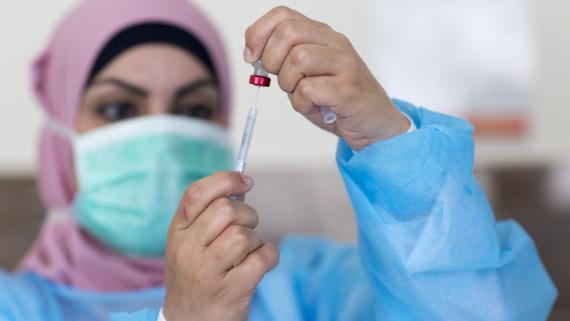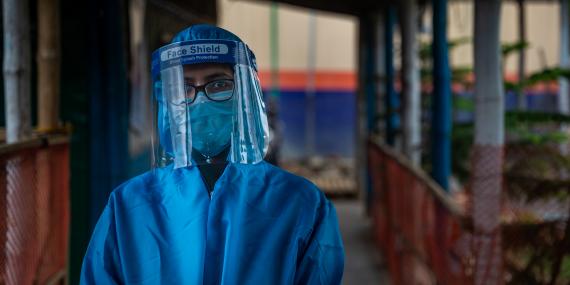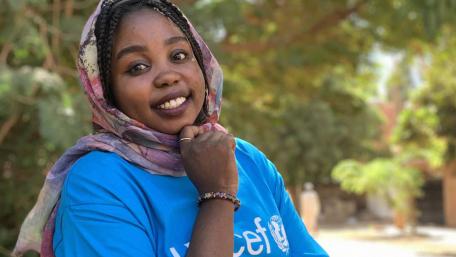Cox's Bazar, Bangladesh
IOM is supporting or operating 35 health-care facilities in Cox’s Bazar, contributing to infection prevention and control, risk communication, community engagement and case management. Despite the provision of personal protective equipment to healthcare providers, staff have been infected with COVID-19. As well as personal suffering, the infection of health staff also results in a vacuum in the workforce and interrupted health services. IOM/Nate Webb
The past decade has seen a steady increase in disease outbreaks, with an average annual growth of 6.9 per cent. Over the past five years, 94 per cent of the countries with inter-agency humanitarian appeals have recorded at least one disease outbreak.
Globally, over 5 million children under 5 years of age face the threats of cholera and acute watery diarrhoea. WHO, UNICEF and Gavi, the Vaccine Alliance, reported that by August 2020, routine immunization services had been disrupted in at least 68 countries due to the COVID-19 pandemic, putting approximately 80 million children under 1 year of age at increased risk of contracting vaccine-preventable diseases.
COVID-19 cases and deaths per country
COVID-19 has hindered essential health services in almost every country (90 per cent), with the greatest impact being felt in low- and middle-income countries. Non-communicable disease diagnosis and treatment have been disrupted by 69 per cent, family planning and contraception by 68 per cent, antenatal care by 56 per cent, and cancer diagnosis and treatment by 55 per cent. Mental health treatment has experienced a 61 per cent disruption (see Mental Health and Psychosocial Support in Humanitarian Emergencies on this report). In terms of communicable diseases, health-care disruptions caused by the pandemic are reversing hard-won gains in the fight against human immunodeficiency virus (HIV), tuberculosis (TB) and malaria. Analyses from WHO, UNAIDS, the Stop TB Partnership and others suggest that the annual death toll due to HIV, TB and malaria could nearly double due to COVID-19, wiping out up to 20 years of progress.
Ensuring equitable access to a COVID-19 vaccine

An effective and fairly distributed COVID-19 vaccine will be key to turning the course of the pandemic, in addition to infection prevention and control measures. The Access to COVID-19 Tools Accelerator (ACT-A) is a global collaboration to accelerate the development, production of and equitable access to COVID-19 tests, treatments and vaccines. ACT-A has three pillars: vaccines, diagnostics and therapeutics. It acts as a connector of health systems. The vaccine pillar, i.e. the COVAX facility, aims to ensure the global distri-bution of vaccines by acting as a platform that will support the research, development and manufacturing of a wide range of COVID-19 vaccine candidates, and negotiate their pricing. All participating countries, regardless of income levels, will have equal access to these vaccines once they are developed. The initial aim is to have 2 billion doses available by the end of 2021, which should be enough to protect high-risk and vulnerable people, as well as frontline health-care workers. Inter-Agency Standing Committee mem-bers are working closely with the COVAX facility to ensure that a ‘humanitarian buffer’ of the eventual vaccine is available for at-risk populations.
UNICEF/Ahed IzhimanThe pandemic has shown how disease can drive humanitarian needs, sharpening the focus on ongoing structural and societal inequalities. Lower-income groups usually face higher rates of chronic health conditions, such as diabetes or heart disease, and they are likely to suffer from underlying conditions such as diarrhoea, gastroenteritis, malaria and TB.
Further reading
Source: OCHA
Source: WHO
References
- Elsevier, Global Research Trends in Infectious Disease, March 2020.
- As determined by the WHO’s Global Health Observatory - Health Emergencies data from 2015-2019.
- UNICEF, Press Release: Over 5 Million Children Face the Threat of Cholera and Acute Watery Diarrhea in the Midst of COVID-19 as Yemen Gets Heavy Rains, April 2020.
- UNICEF, Immunization coverage estimates data visualization, July 2020 and OCHA, Global Humanitarian Response Plan, July 2020
- WHO, Pulse survey on continuity of essential health services during the COVID-19 pandemic: interim report, 27 August 2020
- WHO, Pulse survey on continuity of essential health services during the COVID-19 pandemic: interim report, 27 August 2020
- The Global Fund, Mitigating the Impact of COVID-19 on Countries Affected by HIV, Tuberculosis, and Malaria, June 2020.
- IASC, Key Messages on the COVID-19 Response: Applying the IASC Guidelines on Inclusion of Persons with Disabilities in Humanitarian Action, June 2020
- UN-Habitat, Fighting COVID-19 in Africa’s Informal Settlements, 8 June 2020.





